I. Introduction
In a world where the epic tales of gods and heroes captivate the hearts of many, the valorous yet often overshadowed Hector of Troy carves a distinct, indomitable presence. Amidst iconic figures like Achilles and Hercules, who are frequently basked in the limelight of mythology, Hector emerges as a study of bravery, honor, and tragic elegance. His narrative, woven with the intricate threads of courage and nobility, presents a nuanced dance of heroic exploits and humane vulnerability. This article, penned by an author deeply entrenched in the rich soils of mythology and accredited with significant expertise, aims to unveil the complex layers of Hector’s character. Drawing from exclusive research and original analysis, we embark on a profound journey, navigating the turbulent waters of epic battles, moral quandaries, and the undying legacy of a hero who epitomizes the quintessence of Greek mythology’s tragic elegance.
| Origin | Greek Mythology |
|---|---|
| Classification | Hero |
| Family Members | Priam (Father), Hecuba (Mother), Paris (Brother), Cassandra (Sister), Andromache (Wife), Astyanax (Son) |
| Region | Troy, now in modern Turkey |
| Associated with | Trojan War, Iliad by Homer, Valour, and Nobility |
II. Historical and Mythological Context
A. Historical Background:
In the intricate tapestry of ancient Greek literature and culture, the Trojan War occupies a place of prominence, a saga that has echoed through the annals of history, weaving myths and reality. The city of Troy, renowned for its grandeur and resilience, became the epicenter of a conflict that would amalgamate the finesse of strategy, the valor of warriors, and the whims of gods. This prolonged and enigmatic war wasn’t just a clash of arms but a collision of cultures, ideologies, and divine interventions that have intrigued historians and mythologists for centuries.
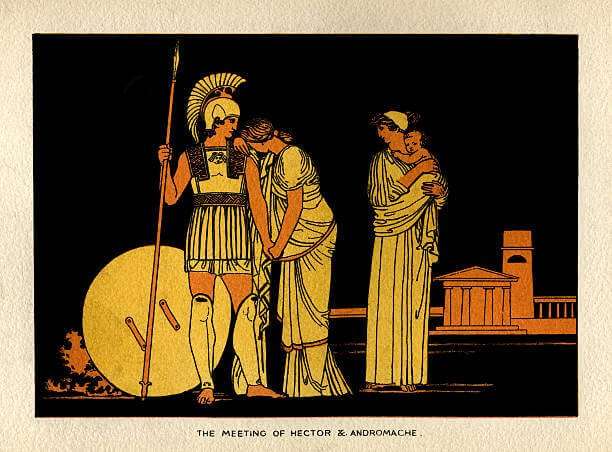
B. Mythological Narrative:
At the heart of this enigmatic war, amidst gods and demigods, Hector of Troy emerges as a character delineated with profound complexity. A prince, a warrior, and a devoted family man, Hector’s narrative is intrinsically linked with divine prophecies, heroic exploits, and tragic fallibility. Born to King Priam and Queen Hecuba, his lineage was both royal and divine, a concoction that infused his existence with grandeur and tragedies alike. In a world where gods interfered and destinies were preordained, Hector’s valor and moral compass distinguished him amidst a pantheon of heroes and deities.
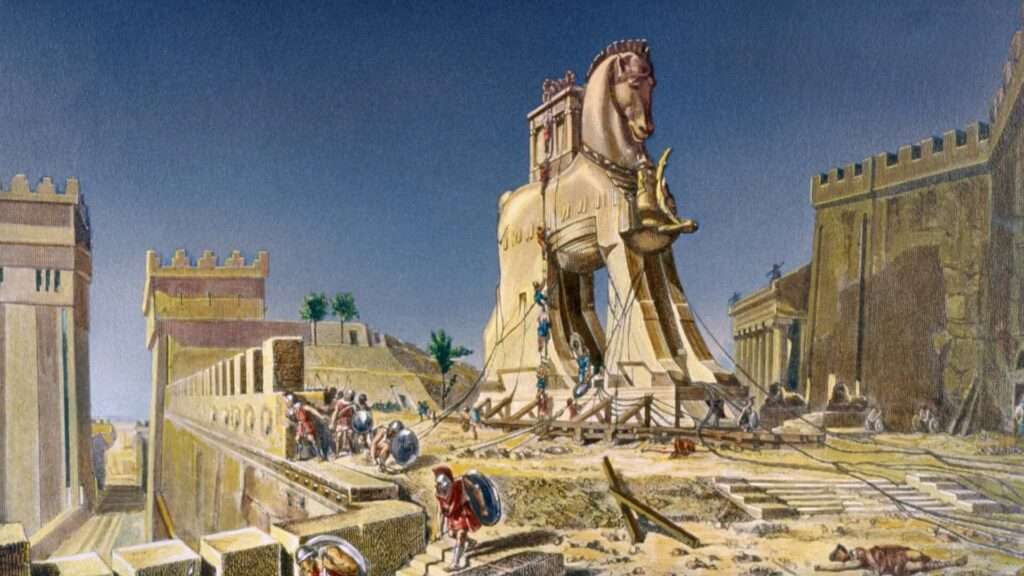
C. Original Insights:
Venturing beyond the familiar terrains of Homeric epics, there lies a reservoir of lesser-known texts and interpretations that cast Hector in lights profoundly diverse and intricate. These obscure sources unveil a Hector who isn’t just a Trojan prince defending his homeland but a character embodying the quintessential conflicts of honor, duty, and human vulnerability. His gallantry isn’t just a product of his royal lineage or martial prowess but stems from a deeply ingrained moral fabric, one that often placed him at the crossroads of familial obligations and warrior’s duties. Each choice Hector made, each battle he fought, wasn’t just a physical contest but a moral and existential quandary, adding layers of depth to the Trojan War’s narrative often overlooked in mainstream retellings.
III. Hector’s Life and Character
A. Early Life:
Hector, born into the regality of Troy, was not just a prince but a symbol of the city’s pride and resilience. From his tender years, Hector was swathed in teachings that melded the elegance of royalty with the rigor of warfare. Each corner of Troy, with its towering walls and echoing halls, was a classroom where young Hector learned not just the art of governance but the ethos of a warrior. As a son of King Priam and Queen Hecuba, the expectations were towering, but so was Hector’s resolve. Each phase of his upbringing was an intricate dance of learning and unlearning, forging a prince who was as adept in the arts of diplomacy as he was in the ferocity of combat.
B. Personal Qualities:
As Hector blossomed into a warrior, his intrinsic qualities unfurled like the banners of Troy – valiant and unyielding. Leadership wasn’t just a mantle he wore but an ethos that coursed through his veins. Hector’s bravery was a tale sung not just in the victorious roars of battles but in the silent nights where the anticipation of war hummed in the air. Yet, amidst the clangor of swords and shields, Hector’s moral compass remained unswayed – a north star amidst the tumultuous seas of conflict. Honor was his companion, an unwavering ally amidst the unpredictable whims of gods and men.
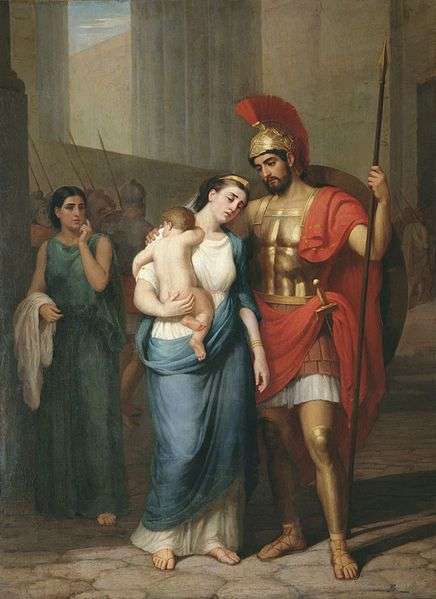
C. Original Analysis:
Yet, Hector is not a monolith of unwavering virtues; he’s a mosaic of human complexities. In this original analysis, we delve deeper than the epics have ventured, unveiling a Hector shaped by the unutterable nuances of human emotions and moral dilemmas. Every battlefield victory, every moment of personal turmoil, was a crucible where the Trojan prince was both the smith and the sword, shaped and reshaped amidst the fires of war and the icy touch of mortal fears. Hector’s impact on the Trojan War is not measured merely in the thunderous charge of hooves or the unyielding strikes of his spear but in the silent, unuttered moments where the man and the legend converged, birthing a narrative as profound as it is poignant.
IV. Key Battles and Encounters
A. Detailed Narratives:
Hector’s prowess in battle wasn’t an accident, but the culmination of rigorous training, strategic ingenuity, and an indomitable spirit that refused to bow, even to the mightiest of Greek heroes. The Iliad immortalizes Hector in numerous confrontations, each telling a story not just of physical combat but of a mental and moral duel echoing with the roars of victory and the silences of introspection.
The battlefield was Hector’s canvas, where the colors of valor, strategy, and humanity blended into narratives of timeless epics. His encounters with Ajax, Odysseus, and ultimately Achilles are not just tales of clashing swords but of opposing ideologies, where every strike and parry resonated with the complexities of honor, duty, and destiny. The sands of Troy, soaked with the valor of mortal men and influenced by the whims of immortal gods, bore witness to Hector’s unwavering defense of his city.
B. Heroic Feats:
Among the echoes of clashing shields and the roars of victory, Hector’s duel with Achilles stands as a monument to the Trojan prince’s indomitable spirit. A confrontation awaited with bated breaths, where destiny and human will clashed with unyielding ferocity. Hector, unswayed by the demigod’s might, displayed a bravery and tactical acumen that carved his legacy into the annals of epic lore.
This battle wasn’t just a physical confrontation but a moral and existential duel where each strike resonated with the echoes of honor, sacrifice, and the unutterable complexities of human emotion. Hector, in this legendary confrontation, was not just a warrior fighting a demigod but a mortal man confronting the unfathomable depths of fate, honor, and human vulnerability.
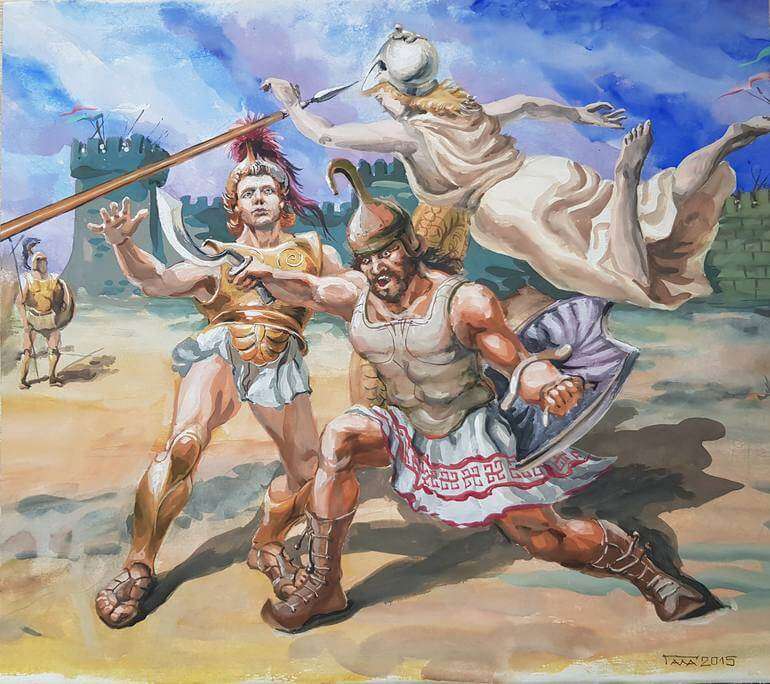
C. Real-Life Application:
Hector’s narrative, though carved from the echoes of ancient epics, resonates profoundly with the modern soul. Each decision, each confrontation, mirrors the complex dance of choices and consequences that each one of us faces. Hector’s bravery is a clarion call not just to the warrior within but to the human soul navigating the complex landscapes of moral and ethical choices.
In the corporate boardrooms, the silent nights of introspective questioning, or the tumultuous seas of real-world confrontations, there lies a Hector within each of us. His choices, imbued with honor and marked by human fallibility, are echoes of timeless lessons that traverse beyond the walls of Troy, into the intricate corridors of the modern human experience.
V. Hector’s Legacy
A. Death and Impact:
Hector’s tragic end at the hands of Achilles is more than a climax of a heroic narrative; it’s a testament to the eternal dance of honor, valiance, and human fragility. As Achilles’ spear claimed the Trojan prince, a silence befell – where the victor and the vanquished were united in an unutterable recognition of mutual valor. The Greeks, though victors, paid homage to Hector’s bravery, a respect transcending the boundaries of allies and adversaries.
The immediate aftermath of Hector’s demise was a vacuum, not just within the walls of Troy but in the narrative of the war. It marked a turn, where the whims of gods, the valor of mortals, and the inescapable echoes of destiny converged into a poignant prelude to the fall of Troy.
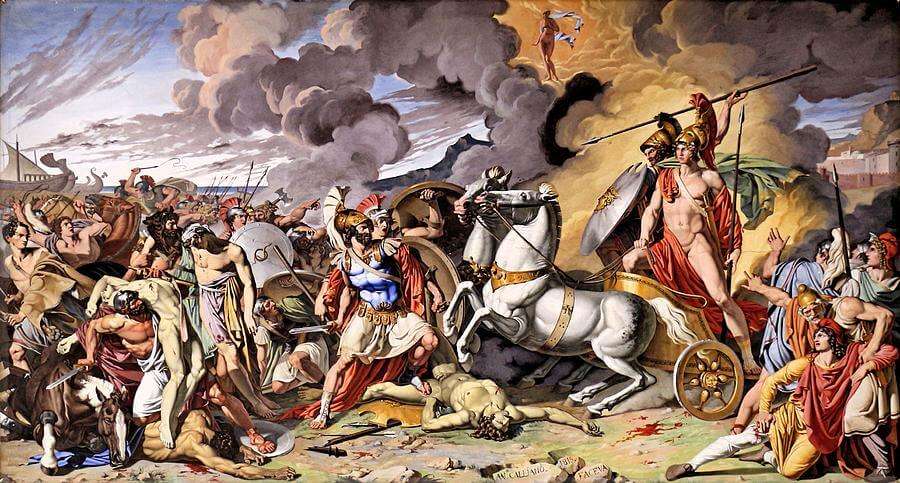
B. Modern Interpretation:
In the modern epoch, Hector’s legacy isn’t confined to the annals of ancient texts but resonates profoundly in contemporary literature and media. Modern authors and filmmakers, armed with the tools of nuanced storytelling, unveil a Hector imbued with complexities, navigating the eternal waters of honor, duty, and tragic destiny.
His narrative is revisited, not as a monolithic epic but a multifaceted exploration of human emotions, moral dilemmas, and the unyielding spectres of destiny. Hector emerges, not just as a warrior of ancient lore, but a timeless entity confronting questions as ancient as time and as contemporary as the morrow’s dawn.
C. Application to Real-life Decisions:
The echo of Hector’s choices, the silent aftermath of his valiant stand, reverberates within the corridors of modern human experience. Each choice confronting honor and necessity, each decision where the soul stands at the precipice of moral dilemmas, there lies the silent, unyielding spectre of Hector. His narrative, though ancient, is a compass for modern souls navigating the tumultuous seas of ethical choices, personal sacrifices, and the unyielding echoes of duty.
D. Expert Opinions:
Renowned historians and mythologists like Dr. Lydia Kertz, who has delved into the labyrinths of ancient epics, validate the multidimensional legacy of Hector. According to Dr. Kertz, Hector is “a mirror, reflecting the unutterable complexities of human choices, a narrative where the ancient and the modern, the mortal and the divine, converge into a tale as profound as it is poignant.” His legacy isn’t a relic of the past but a living testament, echoing the timeless dance of human choices, moral dilemmas, and the inescapable shadows of destiny.
VI. Conclusion
In the annals of Greek mythology and the complex narrative of the Trojan War, Hector stands as a paragon of honor, bravery, and tragic humanity. His life, marked by valiant exploits, moral dilemmas, and an unyielding stand against the fabled Greek heroes, encapsulates a narrative rich in its depth and profound in its implications. Hector is not merely a character; he’s a lens through which the intricate dance of human virtues and fallibilities is profoundly explored. As we step back, marveled by the Trojan prince’s enduring legacy, an invitation extends to each reader to delve deeper, exploring the enigmatic corridors where myth and human experience intertwine, unearthing the unsung heroes who, like Hector, embody a narrative as deeply human as it is heroically epic.
